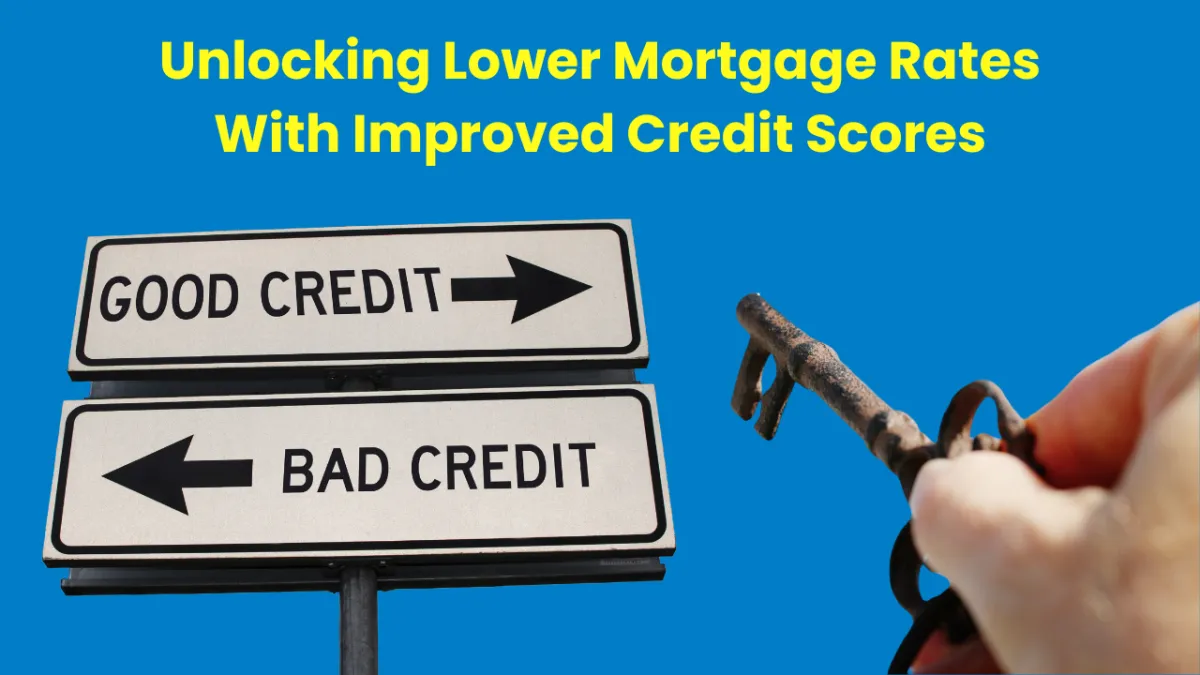Blog

Unlocking Lower Mortgage Rates with Improved Credit Scores
Boost Your Credit Score for a Dream Home in San Joaquin County
Laying the Foundation for Homeownership
Embarking on the journey to homeownership in San Joaquin County begins with a critical step: understanding the significance of your credit score. This three-digit number is more than just a financial statistic; it reflects your creditworthiness and is a pivotal factor in determining the terms of your mortgage. A strong credit score doesn’t just open the door to loan approval and influences the interest rates you'll be offered. In the realm of real estate, particularly in the competitive San Joaquin County market, these details can substantially impact your homebuying experience and long-term financial health.
The relationship between your credit score and the cost of borrowing for a home is direct and profound. A higher score typically signifies to lenders that you're a low-risk borrower, which in turn can lead to more favorable mortgage terms. This is especially important given the variety of mortgage products available and the differing requirements of each. Understanding this relationship is key to securing a mortgage and ensuring it aligns favorably with your financial goals and capabilities.
As an article from CNBC highlights,
“When it comes to mortgages, a higher credit score can save you thousands of dollars in the long run. This is because your credit score directly impacts your mortgage rate, which determines the amount of interest you’ll pay over the life of the loan.”
This insight underscores the tangible benefits of a robust credit score. A lower mortgage rate, resulting from a higher credit score, can translate into significantly reduced interest payments over the life of your loan. This can mean more manageable monthly payments, greater overall savings, and a larger budget for your home purchase. In a region like San Joaquin County, where the real estate market can be dynamic and competitive, these savings and advantages are not just theoretical—they're a practical pathway to securing your dream home under the best possible financial terms.
Understanding Credit Scores and Mortgage Rates
Your credit score serves as a critical barometer for lenders in determining your mortgage rate. This numerical representation of your credit history provides a snapshot of your financial stability and reliability. Lenders scrutinize this score because it helps them gauge the level of risk associated with lending you money. A higher credit score suggests a history of responsible credit management, which implies that you're more likely to make your mortgage payments on time. This perception of lower risk is highly favorable in the eyes of lenders.
A higher credit score often translates to lower interest rates on your mortgage. Interest rates are the cost you pay for borrowing money, and they significantly affect the total amount you'll spend on your home over time. Lower rates mean lower monthly payments and less interest paid over the life of the loan. This cost reduction can substantially impact your budget, freeing up funds for other investments, renovations, or savings.
Moreover, the advantages of a high credit score extend beyond just the interest rates. It can also affect the terms of the mortgage, such as the duration of the loan and the down payment required. Some lenders offer more flexible terms to borrowers with higher scores, including lower down payment requirements or more favorable loan structures.
Having a favorable mortgage rate can give you a significant edge in a market like San Joaquin County, where real estate opportunities are diverse and dynamic. It can broaden your options regarding the types of properties you can afford and may even place you in a better position when negotiating purchases. A strong credit score can open up a wider range of possibilities in your home-buying journey, making it easier to find a home that meets both your desires and your budget.
The Ideal Credit Score for Homebuyers
While a perfect credit score is not a prerequisite for homebuying, aspiring homeowners should know the benefits of aiming for a higher range. In the complex landscape of mortgage lending, your credit score acts as a key determinant in whether you qualify for a mortgage and the kind of mortgage offers you receive. A higher credit score can open the door to a wider array of mortgage products, some of which may offer more favorable terms and conditions. This is particularly true in competitive real estate markets like San Joaquin County, where every advantage counts.
Pursuing a higher credit score is about positioning yourself as a borrower in the best possible light. It's about demonstrating to lenders that you're a responsible credit user and, by extension, a lower-risk borrower. This perception can make a significant difference in the mortgage process. Lenders are often more willing to negotiate rates and terms with borrowers with higher credit scores. Additionally, a higher score can sometimes mean the difference between a straightforward loan approval process and one that involves additional scrutiny or requirements.
As Business Insider explains,
“. . . you don’t need a perfect credit score to buy a house. . . . Aiming to get your credit score in the ‘Good’ range (670 to 739) would be a great start towards qualifying for a mortgage. But if you’re wanting to qualify for the lowest rates, try to get your score within the ‘Very Good’ range (740 to 799).”
This advice is particularly pertinent for those navigating the real estate market for the first time. Achieving a credit score in the 'Good' range is a commendable goal that can facilitate the mortgage process, making it smoother and more predictable. For those looking to optimize their financial position further, pushing the score into the 'Very Good' range can result in even more advantageous loan conditions. This could include lower interest rates, which have a compounding effect over the life of a mortgage, ultimately leading to significant savings and a more manageable financial commitment.
Strategies for Credit Score Improvement
Timely Payments: A Cornerstone of Credit Health
Maintaining a positive payment history is fundamental to ensuring a healthy credit score. This aspect of your financial behavior accounts for a significant portion of your credit score calculation. Timely payments demonstrate to lenders and credit bureaus that you are responsible and reliable when it comes to meeting your financial obligations. Each on-time payment is a positive mark on your credit report, contributing to a history that lenders will view favorably.
Conversely, late payments can have a detrimental impact. A single late payment can stay on your credit report for up to seven years and can cause a noticeable drop in your score. This is because lenders view late payments as a sign of potential risk. They raise concerns about your ability to manage debt and meet financial obligations consistently. To avoid this, setting up reminders or automatic payments can be a proactive strategy to ensure you never miss a due date. Remember, even payments that are only a few days late can be reported to credit bureaus.
Managing Your Debt-to-Credit Ratio
Your debt-to-credit ratio, also known as your credit utilization rate, is another crucial factor in your credit score. This ratio measures how much of your available credit you are using. Credit scoring models typically favor a lower credit utilization rate, suggesting that you are not overly reliant on credit and manage your debts responsibly. A common guideline is to keep your utilization below 30% of your total available credit, though lower is always better.
High credit utilization can be a red flag to lenders, indicating that you might be experiencing financial strain or are at risk of overextending yourself. To improve your debt-to-credit ratio, you can focus on paying down existing debt and avoiding taking on new debt. It's also beneficial to keep old credit accounts open, even if you don't use them often, as they contribute to your total available credit. Regularly monitoring your credit utilization and adjusting your spending habits can positively impact your credit score over time.
Navigating Credit Applications
When you're in the process of planning to buy a home, it's important to approach new credit applications with caution. Every time you apply for new credit, whether it's a credit card, a car loan, or any other form of credit, the lender conducts what is known as a "hard inquiry" on your credit report. These inquiries are noted on your credit report and can temporarily lower your credit score. This is because frequent applications for new credit can be interpreted as a sign that you're in a financially unstable position or are taking on more debt than you can handle.
Furthermore, new credit accounts reduce the average age of your credit history. A longer credit history is generally more favorable in the eyes of lenders, as it provides a more extended track record of your financial behavior. Opening new credit accounts can thus have a dual impact: increasing your total available credit but potentially signaling risk if it appears you're rapidly expanding your access to credit.
As FICO notes,
“While many lenders use credit scores like FICO Scores to help them make lending decisions, each lender has its own strategy, including the level of risk it finds acceptable. There is no single “cutoff score” used by all lenders and there are many additional factors that lenders may use to determine your actual interest rates.”
This statement from FICO underscores that lending decisions are based on various factors, not just your credit score. Lenders look at your credit report, income, employment history, and other aspects of your financial life. They use this information to build a profile of your creditworthiness and determine the loan terms they offer you. Therefore, while maintaining a high credit score is crucial, it's also important to consider the broader context of your financial situation when applying for new credit, especially in the lead-up to a major purchase like a home.
Working with a Trusted Lender
Consulting with a lender is an invaluable step for prospective homebuyers, especially in complex markets like San Joaquin County. A lender isn't just a gateway to securing a mortgage; they are knowledgeable professionals who can provide bespoke advice tailored to your unique financial circumstances. This personalized guidance is crucial in navigating the often intricate home financing landscape.
Lenders deeply understand how credit scores impact mortgage eligibility and terms. They can analyze your credit report in detail, helping you understand your score and the factors influencing it. This includes explaining how your payment history, debt levels, and types of credit affect your score and, consequently, your mortgage options. They can also offer practical advice on improving your score over time, which could lead to more favorable loan conditions.
Beyond credit scores, lenders are adept at explaining the various mortgage products available in the market. There's a wide array of mortgage options, each with its own set of rules, rates, and requirements. These include fixed-rate, adjustable-rate mortgages, government-insured loans like FHA and VA, and non-conventional loans. A lender can help you understand the nuances of each option, guiding you toward the one that best suits your financial goals and situation.
Furthermore, lenders can provide insights into current mortgage rates and trends, helping you time your application to get the best possible rate. They can also assist in calculating the overall costs of different mortgage options, including down payments, interest rates, and any additional fees. This comprehensive financial analysis can be pivotal in making a well-informed decision that aligns with your long-term financial planning.
In essence, a lender is much more than just a provider of loans; they are partners in your journey to homeownership. They can demystify the complex processes and decisions involved, ensuring that you are equipped with the knowledge and understanding needed to make choices that are right for you and your future home.
Bottom Line: Your Path to Homeownership
Improving your credit score is a vital step towards homeownership in San Joaquin County. As you focus on building a solid credit foundation, you set the stage for obtaining a better mortgage rate. This, in turn, makes the dream of owning a home more attainable and financially manageable.
Were you thinking of buying a home in the upcoming year? Reach out to our expert real estate team for guidance in the San Joaquin County market. We are here to assist you in finding your perfect home and navigating the financial aspects of home buying.






